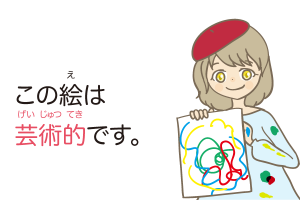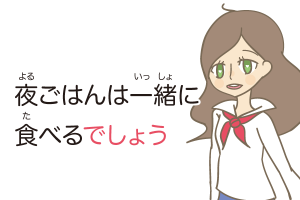Last time, you learned how Japanese prefixes and suffixes work, e.g. “ビジネス上、外国語を話せることは便利だ (it’s useful to be able to speak foreign languages from a business point of view).” In this lesson, you will learn a similar concept again, which is to express additional meanings by placing something at the end. That’s sentence ending particles.
Explanation for the Usage of な, なあ, っけ, わ, and ぞ
| Table of Contents Sentence Ending Particle な Sentence Ending Particle なあ Sentence Ending Particle っけ Sentence Ending Particle わ Sentence Ending Particle ぞ Sentence Ending Particle さ Filler Words |
In the basic grammar section, you already learned the three sentence ending particles よ, ね, and よね. The ones that we will introduce here have the same characteristics. That is to say, they appear only in conversation and sound casual, but they are significant to making natural expressions. Let’s check each usage one by one. Note: English translations don’t make much sense here. Please focus on the original functions.
Sentence Ending Particle な
| 海に行きたいな。 [I] want to go to the sea, don’t I? |
| あの意見には反対だな? As for that opinion, [you] disagree with [it], right? |
| えーと、最近旅行に行っていないな。 Let me see. [I] haven’t traveled recently. |
| (ううん / いいえ)、今日は暑くないな。 No, today is not hot. |
な has almost the same functions as the sentence ending particle ね, which are to seek the listeners’ agreement (*the first example), to seek the listeners’ confirmation (*the second example), to imply the speakers’ consideration (*the third example), and to emphasize the speakers’ denial (*the fourth example). The difference between them is that な is generally used by MALEs and may make your speech a little offensive. The polite form doesn’t generally appear in this context except for when the elderly use な.
Sentence Ending Particle なあ
| この本、面白いなあ。 [I’ve noticed] this book is interesting. |
| 会社に行きたくないなあ。 [I’ve realized] [I] don’t want to go to office. |
| 今日は疲れたなあ。 [Looking back on the past] as for today, [I] got tired. |
| 昨日は暑かったなあ。 [Looking back on the past] as for yesterday, it was hot. |
In general, you use なあ when you talk to yourself. Thus, the polite form doesn’t appear here. なあ has two functions. The first is to indicate that you have discovered something. The second is to emotionally say something when you look back on the past.
The あ is sometimes omitted. Try not to be confused with the sentence ending particle な. You need to judge which function な works as based on the context.
| この本、面白いなあ。 |
| 会社に行きたくないなあ。 |
| 今日は疲れたなあ。 |
| 昨日は暑かったなあ。 |
[adsense]
Sentence Ending Particle っけ
| ごめん、名前は何(だった / でした)っけ? Sorry, what is [your] name? |
| 空港はどこにあるん(だった / でした)っけ? Where is the airport? |
| 日本は寒いん(だった / でした)っけ? Is Japan cold? |
| 前に会ったことが(ある / あります)っけ? Have [I] met [you] before? |
The function is to indicate that you are not sure about your memory. For example, with the first example, っけ implies that you have asked before, but you forget his/her name. That is to say, you can only use っけ to things you should’ve known. っけ is generally used with expressions which indicate the past such as the ta-form and ことがある.
Sentence Ending Particle わ
| 今日は暑い(です)わ。 As for today, it’s hot. |
| ハンカチを忘れて(いる / います)わよ。 [You] forget [your] handkerchief. |
| 夏はいい(です)わね。 Summer is good, isn’t it? |
| 明日映画館に(行く / 行きます)わよね? [We] will go to a theater tomorrow, right? |
It is said that women customarily add わ at the end of sentences without a particular meaning. However, the younger generation doesn’t do so today. We guess that you hear this expression only in manga (*Some dialects use わ at the end of sentences, but it’s different from this わ). The point of the usage is that you can use わ together with よ, ね, or よね at the same time.
Sentence Ending Particle ぞ
| 早く学校に行くぞ。 [I] will go to school early. |
| このレストランは美味しいぞ。 This restaurant is delicious. |
| ダイエットをするぞ。 [I] will go on diet. |
| 一緒に勉強するぞ。 Let’s study together. |
This is a masculine expression and emphasizes the speaker’s will or opinion. When you use ぞ to listeners, your speech sounds like an invitation, e.g. “let’s.” However, it may sound commanding when compared with the volitional form like 勉強しよう. In manga, you may hear a combination between the polite form and ぞ like 勉強しますぞ. Practically speaking, the polite form should not be used with ぞ, which sounds weird.
ぜ is a similar masculine sentence ending particle. But, this is not used in practice today. We have introduced this to you because you may still see this in manga.
| 早く学校に行くぜ。 |
| このレストランは美味しいぜ。 |
| ダイエットをするぜ。 |
| 一緒に勉強するぜ。 |
Sentence Ending Particle さ
| 強く叩いたら痛いさ。 If [you] strongly slap, it’s painful. |
| 気にすることはないさ。 [You] don’t have to take care. |
| 僕も日本語が話せるさ。 [I] can also speak Japanese. |
さ has been a uncommon word gradually, but let us explain the usage for the sake of completion. There are three functions. The first is to emphasize your statement or opinion (*the first example), the second is to lightly say something which may sound irresponsible (*the second example), and the third is to imply that you are refuting something (*the third example).
Filler Words
| 今日な、田中さんに会ったよ。 [I] met Tanaka-san today. |
| 明日からさ、旅行に行くらしい。 [I] heard that [he/she] will travel tomorrow. |
| 帰ってくるのはね、10日みたい。 [The date] when [he] will come back is the 10th. |
な, さ and ね often appear as a filler word. They don’t have a particular meaning. Although filler words make your speech natural, you should avoid using them too much.
Summary
- な has almost the same function as ね.
- to seek the listeners’ agreement
- to seek the listeners’ confirmation
- to imply the speakers’ consideration
- to emphasize the speakers’ denial
- なあ is used to talk to yourself and has two functions.
- to indicate that you have discovered something
- to emotionally say something when you look back on the past
- っけ indicates that you are not sure about your memory.
- Women (used to) customarily place わ without a particular meaning.
- ぞ is a masculine expression and emphasize speaker’s will or opinion.
- さ is not a common word today, but has three functions.
- to emphasis your statement or opinion
- to lightly say something which may sound irresponsible
- to imply that you are refuting something
Sentence ending particles tend to get affected by people’s habits, coinages, and dialects which make them difficult to learn. As of today, ones that you have to master are な, なあ, and っけ along with the basic ones: よ, ね, and よね. They are frequently used in everyday life. There are still other expressions placed at the end of sentences. We will pick them up in the next section: advanced sentence patterns.





